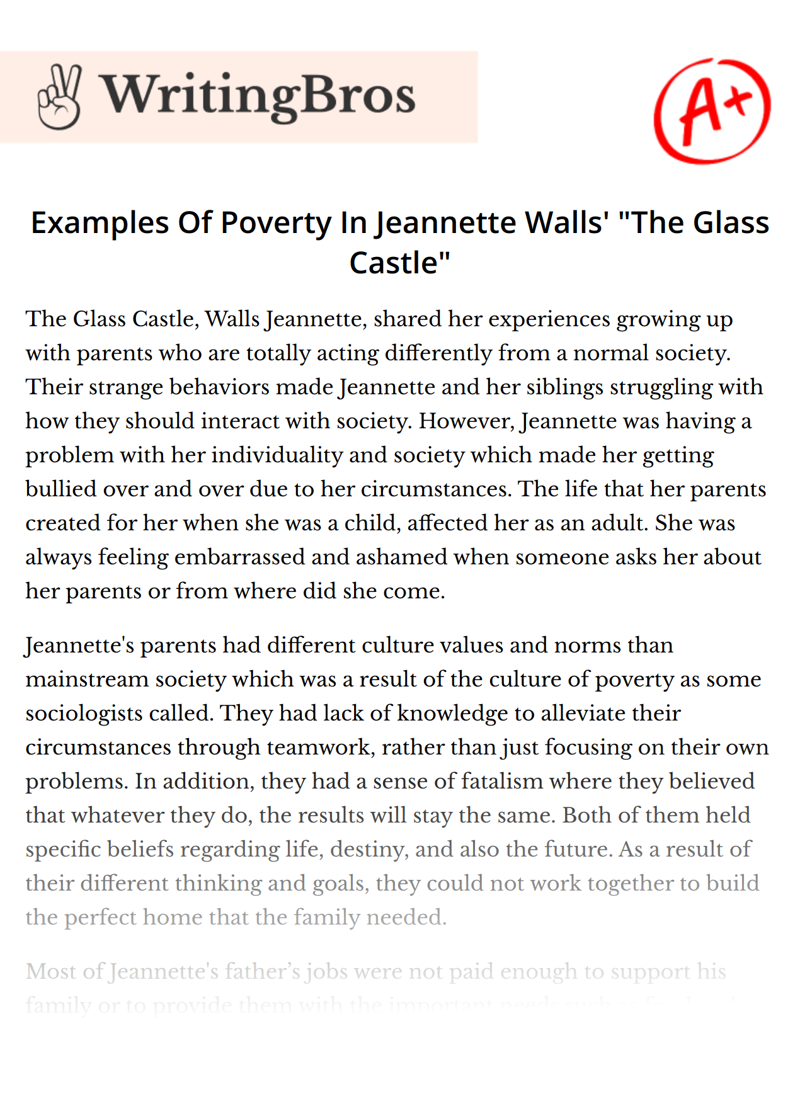Examples Of Poverty In Jeannette Walls' "The Glass Castle"

The Glass Castle, Walls Jeannette, shared her experiences growing up with parents who are totally acting differently from a normal society. Their strange behaviors made Jeannette and her siblings struggling with how they should interact with society. However, Jeannette was having a problem with her individuality and society which made her getting bullied over and over due to her circumstances. The life that her parents created for her when she was a child, affected her as an adult. She was always feeling embarrassed and ashamed when someone asks her about her parents or from where did she come.
Jeannette's parents had different culture values and norms than mainstream society which was a result of the culture of poverty as some sociologists called. They had lack of knowledge to alleviate their circumstances through teamwork, rather than just focusing on their own problems. In addition, they had a sense of fatalism where they believed that whatever they do, the results will stay the same. Both of them held specific beliefs regarding life, destiny, and also the future. As a result of their different thinking and goals, they could not work together to build the perfect home that the family needed.
Most of Jeannette's father’s jobs were not paid enough to support his family or to provide them with the important needs such as food and electricity due to his immediate gratification which means that any money he was getting, he was spending it in alcohol directly. He was using investment strategy where he was not saving some money for emergency situations. As a result, Jeannette was going to school without lunch which forced her to steal from her classmates bags or steal for her friend's house. On the other hand, her brother's condition was no better than her. He broke into his neighbors' house and stole food. However, they lived in a place with no electricity where Jeannette had to join the school newspaper after school to keep her from starving with the cold in her house.
The culture of poverty presumes the advancement of a lot of degenerate standards, and that makes poor people act in non-behavioral ways and not desirable to the normal society, not because they want to, but because they have no other choice due to the lack of job opportunities. Since Jeannette's father did not find a job, he found a way to get a lot of money by exploiting Jeannette. Jeannette became cheap between Robbie's hands who made her a way of amusing. She provided her father with money, but she could not speak up because she and her siblings need this money. Due to the culture of poverty, Jeannette was feeling hopelessness or desperation from her father in many situations especially when she told him about what Robbie did. She was having a hope since he told her that he would kill anyone touches her. But her hope faded, when her father did not react seriously.
The culture of poverty theory believes that students with low-Income achieve poorly in school because socialization in their families and networks doesn't outfit them with the information. Jeannette's father played a big role in educating his children at home. When Jeannette went to school for the first time, she was participating a lot since she was homeschooled. As a result, the girls were hating her. So, she didn't participate when she went to another school because of her lack of interaction with people. Her father taught them a lot of things, but he didn’t teach them how to fit in groups.
Jeannette and her siblings were very lucky to avoid the fate that most in their situation would have faced: foster care, homelessness, lack of community support. This poor family was succeeded due to their believing in things that will never happen like Dad's consistent promises to create the glass castle. Jeannette's hope was in her family as hopeless as it may be was as the glue of this family.
Cite this Essay
To export a reference to this article please select a referencing style below

